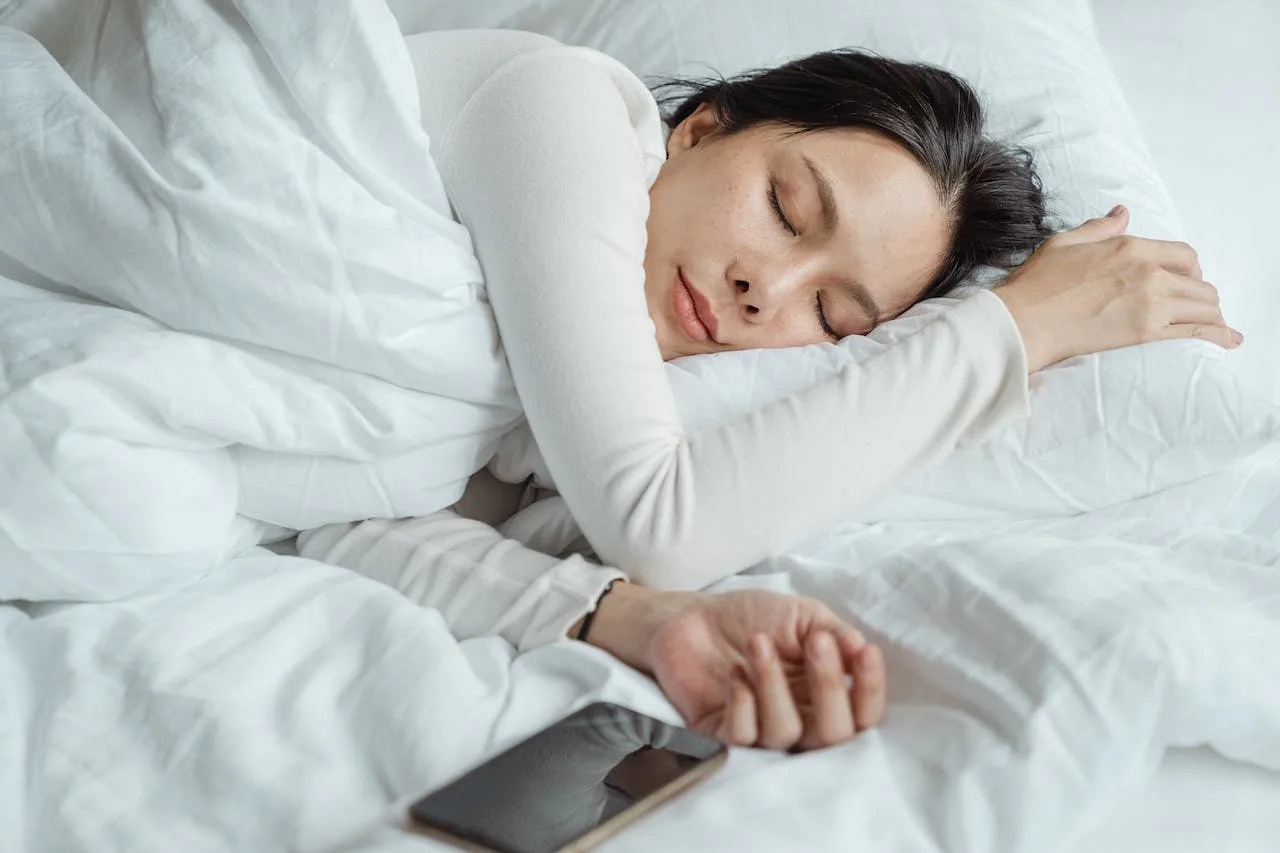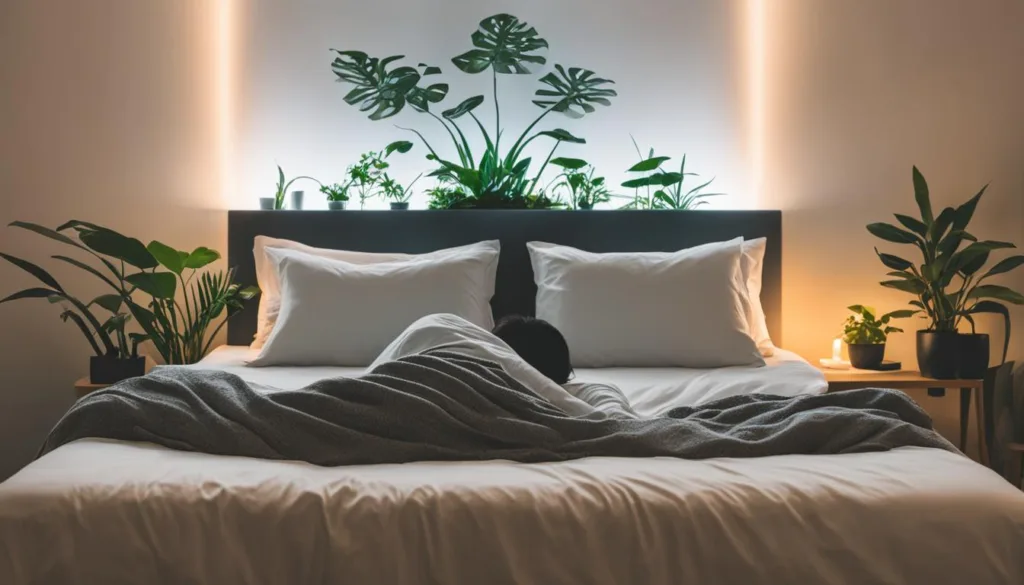Sleep and Mental Health – The 3-Step Blueprint to Achieving Mental Wellness Through Quality Sleep
Introduction to Sleep and Mental Health
Quality sleep is essential for our mental and physical health. As busy individuals, it can be easy to overlook the importance of sleep.
However, getting enough sleep and ensuring that it is of good quality is crucial for mental wellness and overall well-being.
Studies have shown that sleep deprivation can lead to negative effects on our mental health, including depression, anxiety, and stress.
On the other hand, getting enough sleep can improve cognitive function, memory, and reduce the risk of developing mental illnesses.
Connection Between Sleep and Mental Health
In this article, we will discuss the 3-step blueprint to achieve mental wellness through quality sleep. We will explore the following steps:
- Establishing a consistent sleep schedule
- Creating a sleep-enhancing environment
- Prioritizing sleep hygiene and mental wellness
Key Takeaways
- Quality sleep is crucial for our mental wellness and overall well-being.
- Sleep deprivation can lead to negative effects on our mental health.
- Getting enough sleep can improve cognitive function, memory, and reduce the risk of developing mental illnesses.
- The 3-step blueprint for achieving mental wellness through quality sleep includes establishing a consistent sleep schedule, creating a sleep-enhancing environment, and prioritizing sleep hygiene and mental wellness.
- It’s important to make quality sleep a priority in our daily routine to promote better mental health.

Sleep and Mental Health: Establish a Consistent Sleep Schedule
Consistency is key when it comes to improving your sleep patterns and overall mental health. By going to bed and waking up at the same time every day, you can regulate your body’s internal clock and improve the quality of your sleep.
Our bodies thrive on routine, and establishing a regular sleep schedule can help prepare your mind and body for a restful night’s sleep.
Dream Your Way to Wellness: A 3-Step Plan for Superior Sleep and Mental Health
Benefits of a Consistent Sleep Schedule: |
|---|
| Improved sleep quality: By training your body to recognize when it’s time to sleep, you can fall asleep faster and stay asleep longer. |
| Increased alertness: A consistent sleep schedule can help you feel more rested and alert during the day, improving your productivity and overall well-being. |
| Better mood: Quality sleep has been linked to improved mood and emotional regulation, making it easier to handle stress and anxiety. |
Here are some tips for establishing a regular sleep routine:
- Set a consistent bedtime and wake-up time, even on weekends.
- Avoid stimulating activities such as screen time or intense exercise before bed.
- Create a relaxing bedtime routine, such as reading or taking a warm bath.
- Avoid taking naps during the day, as they can disrupt your sleep cycle.
“Establishing a consistent sleep schedule has been shown to improve sleep quality and increase alertness and emotional regulation.”
Sleep and Mental Health: Create a Sleep-Enhancing Environment for Optimal Well-being
Did you know that your sleep environment can significantly impact your mental health? It’s essential to create an environment that’s conducive to quality sleep. Here are some tips to help you create an optimal sleep environment:
-
Reduce noise:
Use earplugs or a white noise machine to reduce noises that can disrupt your sleep.
-
Eliminate light:
Use blackout curtains or a sleep mask to ensure complete darkness in your bedroom. Bright light can interfere with your sleep and affect your mental health.
-
Comfortable bedding:
Invest in comfortable pillows, mattresses, and bedding to ensure a comfortable sleep experience.
-
Set a comfortable temperature:
Keep your bedroom at a cool temperature, preferably between 60- and 67-degrees Fahrenheit, for optimal sleep.
-
Declutter your space:
A cluttered environment can lead to stress and anxiety, making it difficult to fall asleep. It’s essential to keep your sleep space tidy and organized to promote relaxation and better mental wellness.
In addition to these tips, it’s crucial to remove any distractions from your sleep space. Keep technology, work-related items, and other distractions away from your bed.
By following these tips, you can create a sleep-enhancing environment that promotes optimal mental health.
Sleep and Mental health: Prioritize Sleep Hygiene and Mental Wellness
Having a consistent sleep schedule and a sleep-enhancing environment is essential for restful and rejuvenating sleep.
However, there is another critical aspect of obtaining quality sleep, and that is sleep hygiene. Sleep hygiene refers to habits and practices that ensure our sleep is conducive to promoting optimal physical and mental health.
Sleep and Mental health -Sleep Smarter, Live Better:
Sleep hygiene practices include maintaining a regular sleep schedule, avoiding caffeine, alcohol, and nicotine before bedtime, and limiting daytime napping.
Additionally, regulating exposure to light and keeping the sleep environment quiet, dark, and cool promote better sleep.
Not prioritizing sleep hygiene can lead to sleep disorders such as insomnia, sleep apnea, and restless leg syndrome, which can significantly impact our mental health by increasing anxiety, depression, and mood disorders.
Snooze Smart: The Link Between sleep and Mental Health
Sleep Disorders |
Impact on Mental Health |
|---|---|
| Insomnia | Increased risk of depression and anxiety. |
| Sleep Apnea | Increased risk of depression and irritability. |
| Restless Leg Syndrome | Increased risk of depression and anxiety. |
Thus, it is vital to prioritize sleep hygiene and adopt practices that ensure restorative sleep, promoting optimal physical and mental health.

Unlocking the Link: Sleep and Mental Health in the Context of Depression
Depression is a serious mental health condition that can affect anyone. Many factors contribute to the development of depression, including genetics, environmental stressors, and chemical imbalances in the brain. However, sleep also plays a significant role in depression.
Studies have shown that people with depression often experience sleep disturbances, such as insomnia or hypersomnia. These disruptions can worsen depression symptoms, making it harder to feel rested and energized during the day.
On the other hand, high-quality sleep has been linked to several mental health benefits, including improved mood and cognitive function.
By prioritizing sleep hygiene and following the three-step blueprint, we can promote better sleep and potentially alleviate some symptoms of depression.
Establish a Consistent Sleep Schedule
One of the best ways to improve sleep quality is to establish a consistent sleep schedule. By going to bed and waking up at the same time every day, our bodies can regulate our sleep-wake cycle, making it easier to fall asleep at night and wake up feeling refreshed in the morning. Be sure to stick to this schedule, even on weekends or days off work.
Create a Sleep-Enhancing Environment
The sleep environment is critical to sleep quality. To create an optimal sleep environment, try to keep your bedroom cool, dark, and quiet.
Use comfortable bedding and consider investing in a good-quality mattress and pillows. Avoid using electronic devices in bed and turn off all electronics at least an hour before bedtime to limit exposure to blue light, which can interfere with sleep.
Prioritize Sleep Hygiene and Mental Wellness
Lastly, prioritize sleep hygiene and mental wellness. This includes developing healthy sleep habits, such as avoiding caffeine and alcohol before bed, engaging in regular physical activity, and managing stress levels. By taking care of our minds and bodies, we can promote better sleep and improve our overall mental health.

Sleep and Mental Health- The link between Sleep and Anxiety
It’s no secret that anxiety can disrupt sleep, often causing insomnia or other sleep disturbances. This can further exacerbate anxiety symptoms, creating a vicious cycle that can be challenging to break. However, there are strategies we can employ to manage sleep disturbances related to anxiety.
Establish a Consistent Sleep Schedule
One of the most effective ways to promote better sleep is by maintaining a consistent sleep schedule. This means going to bed and waking up at the same time every day, even on weekends. By following a regular sleep routine, our body’s internal clock can effectively regulate our sleep and wake cycles.
Create a Sleep-Enhancing Environment
Creating an environment that promotes relaxation can also improve sleep quality. Bedroom temperature, lighting, and noise levels can all affect our ability to fall and stay asleep.
Consider using blackout curtains, comfortable bedding, and relaxing scents like lavender to create a sleep-promoting atmosphere.
Prioritize Sleep Hygiene and Mental Wellness
Practicing healthy sleep habits, such as avoiding caffeine and alcohol, not eating heavy meals before bedtime, and establishing a relaxing bedtime routine, can also improve sleep quality.
Additionally, managing stress and anxiety through activities like meditation, exercise, therapy, and medication can have a significant impact on both mental health and sleep quality.

“It is a common experience that a problem difficult at night is resolved in the morning after the committee of sleep has worked on it.” – John Steinbeck
Harmony in Health: Navigating Sleep and Mental Health to Tackle Stress
Stress can significantly impact your ability to sleep well, and poor sleep can make stress levels worse, creating a vicious cycle.
When we’re stressed, our bodies release cortisol, a hormone that can make it harder to fall asleep and stay asleep. Here are some practical tips to help improve your sleep and reduce stress:
Establish a Consistent Sleep Schedule
Going to bed and waking up at the same time each day can help regulate your body’s sleep-wake cycle, making it easier to fall asleep at night. Avoiding electronics and caffeine before bedtime can also promote better sleep.
Create a Sleep-Enhancing Environment
Make your bedroom a tranquil environment that promotes relaxation. Consider using blackout curtains to block out light and reducing noise with a fan or white noise machine.
Keep your bedroom at a cool and comfortable temperature and invest in a good mattress and pillows for maximum comfort.
Prioritize Sleep Hygiene and Mental Wellness
Practice good sleep hygiene habits, such as avoiding alcohol and heavy meals before bed and establishing a bedtime routine to signal to your body that it’s time to sleep.
Remember to prioritize your mental health by practicing stress-reducing activities, such as meditation or exercise, during the day.
“It’s amazing how a good night’s sleep can make everything better in the morning.” – Christie Brinkley
By implementing these tips for better sleep and mental health, you can work towards breaking the cycle of stress and poor sleep. For further help with stress management and sleep disorders, consult with a healthcare professional.
Sleep and Mental Health: Exploring the Impact on Cognitive Function
Sleep plays a vital role in cognitive function, including critical thinking, problem-solving, and decision-making abilities. During sleep, our brain consolidates information and forms new pathways for learning, memory, and executive functioning.
On the other hand, insomnia, a common sleep disorder, can impair cognitive abilities, leading to reduced concentration, focus, and productivity.
Chronic insomnia is associated with an increased risk of developing mental health conditions like depression and anxiety.
Establish a Consistent Sleep Schedule
Establishing a consistent sleep schedule can improve cognitive function and reduce the risk of insomnia. Going to bed and waking up at the same time every day, even on weekends, can regulate our body’s internal clock, making it easier to fall asleep at night and wake up feeling refreshed in the morning.
Create a Sleep-Enhancing Environment
Creating a sleep-enhancing environment can promote better sleep and cognitive function. Keep the bedroom dark, quiet, and cool, and invest in comfortable pillows and mattresses.
Avoid screen time for 30 minutes before bed and limit noise and light pollution from outside sources.
Prioritize Sleep Hygiene and Mental Wellness
Prioritizing sleep hygiene practices can also support cognitive function and overall mental wellness. Avoid caffeine and alcohol before bedtime, exercise regularly, and manage stress and anxiety levels through relaxation techniques like meditation and deep breathing exercises.
“Sleep is that golden chain that ties health and our bodies together.” – Thomas Dekker
Sleep and Mental Health: Sleep Disorders and Mental Illness
Sleep disorders and mental illnesses are closely linked, with numerous studies highlighting their correlation. Sleep deprivation can worsen the symptoms of mental health conditions, while underlying mental health issues can contribute to sleep disturbances.
Establish a Consistent Sleep Schedule
People with mental health issues often struggle with maintaining a regular sleep pattern, which can exacerbate their symptoms.
Establishing a consistent sleep schedule can help regulate the body’s internal clock and promote better sleep hygiene, reducing the effects of sleep deprivation on mental well-being.
Create a Sleep-Enhancing Environment
The sleep environment can significantly impact the quality of sleep. People with mental health issues may experience heightened sensitivity to loud noises or bright lights, making it harder for them to fall asleep.
Creating a sleep-enhancing environment that is calm, quiet, and dark can improve the chances of getting quality rest.
Sleep-Enhancing Environment Tips |
Sleep-Reducing Environment Elements to Avoid |
|---|---|
| Comfortable mattress and pillows | Uncomfortable bed or pillows. |
| A cool temperature | Warm temperature |
| Minimal noise | Loud or distracting noise |
| Low light or darkness | Bright lights or lots of light |
Prioritize Sleep Hygiene and Mental Wellness
Proper sleep hygiene, such as limiting alcohol and caffeine consumption, avoiding stimulating activities before bed, and maintaining a calming bedtime routine, can help improve sleep quality and promote mental wellness.
Seeking treatment for underlying mental health conditions, such as depression or anxiety, can also address sleep disturbances and improve overall well-being.
Sleep and Mental Health
After reading about the various connections between sleep and mental health, it is clear that quality sleep is essential for achieving optimal mental wellness. In order to achieve this, we must implement the 3-step blueprint for better sleep:
Establish a Consistent Sleep Schedule
One of the most important steps we can take towards better sleep hygiene is establishing a consistent sleep schedule. This means going to bed and waking up at the same time every day, even on weekends.
By doing so, we help regulate our body’s internal clock, leading to better sleep quality and improved mental health.
Create a Sleep-Enhancing Environment
The sleep environment can have a significant impact on our ability to achieve quality sleep. It is important to maintain a comfortable temperature, reduce noise and light disturbances, and invest in a supportive mattress and pillows. By creating an optimal sleep environment, we can promote better sleep and support our mental wellness.
Sleep and Mental Health: Prioritize Sleep Hygiene and Mental Wellness
Sleep hygiene refers to the habits and practices that contribute to better sleep. Prioritizing sleep hygiene can include avoiding caffeine and alcohol before bedtime, reducing screen time in the hours leading up to sleep, and engaging in relaxation techniques such as meditation or deep breathing exercises.
By prioritizing sleep hygiene and our mental wellness, we can promote healthy sleep habits and improve our overall quality of life.
Boost Your Well-Being: Simple Tips for Better Sleep and Healthy Eating
Sweet Dreams for a Better Day
Are you one of the 60 million Americans missing out on enough shuteye? Sleep is like a superhero for your body, helping it recover and recharge.
Stress and worries might be sneakily stealing your sleep, leaving you more vulnerable to work stress. Getting a good 8 hours of sleep each night is like a shield against stress-related health problems. Try sticking to a regular sleep schedule to make it happen.
Fuel Your Day Right
Your food choices play a big role in how you feel at work. Instead of large meals, go for small, healthy ones throughout the day. This keeps your blood sugar level steady, ensuring your energy and focus stay up.
No more mood swings causing extra work stress! Plus, balanced blood sugar is a superhero for your immune system. So, choose wisely, eat well, and conquer your workday with a smile.
Sleep and Mental Health Conclusion:
In conclusion, implementing the 3-step blueprint for better sleep can be a powerful tool in promoting optimal mental wellness.
By establishing a consistent sleep schedule, creating a sleep-enhancing environment, and prioritizing sleep hygiene and mental wellness, we can take control of our sleep habits and work towards achieving better mental health.
The intricate relationship between sleep and mental health is undeniable, shaping a profound impact on our overall well-being.
As we’ve explored the interconnectedness of quality sleep and mental health throughout this discussion, it’s clear that prioritizing one significantly influences the other.
Adequate and restful sleep serves as a cornerstone for maintaining optimal cognitive function, emotional resilience, and psychological balance.
FAQ
Does sleep quality impact mental health?
Yes, sleep quality plays a crucial role in mental health. Poor sleep can lead to an increased risk of developing mental health disorders and can worsen existing conditions.
How important is sleep for mental health?
Sleep is essential for mental health. It allows our brains to recharge, process emotions, and consolidate memories. Quality sleep promotes optimal mental functioning and emotional well-being.
What are some common sleep disorders that affect mental health?
Some common sleep disorders that can impact mental health include insomnia, sleep apnea, restless leg syndrome, and narcolepsy. Proper diagnosis and treatment of these disorders are crucial for overall mental wellness.
Can lack of sleep cause mental health problems?
Yes, chronic sleep deprivation can contribute to the development of mental health problems such as depression, anxiety, bipolar disorder, and cognitive impairments. It is important to prioritize sleep for mental well-being.
What are the mental health benefits of quality sleep?
Quality sleep improves mood, reduces stress and anxiety, enhances cognitive function, and helps regulate emotions. It is a critical component of maintaining overall mental health and well-being.
What are some tips for better sleep and mental health?
Establish a consistent sleep schedule, create a sleep-enhancing environment, practice good sleep hygiene, manage stress effectively, limit caffeine and electronic device use before bedtime, and engage in relaxation techniques to promote better sleep and mental health.
How does sleep affect depression?
Lack of sleep or poor sleep quality can worsen symptoms of depression, making it harder to cope with daily challenges. Quality sleep plays a vital role in managing and improving depressive symptoms.
What is the relationship between sleep and anxiety?
Sleep disturbances are common in individuals with anxiety disorders, and lack of sleep can also exacerbate anxiety symptoms. Establishing healthy sleep habits and managing anxiety can improve sleep quality and overall mental well-being.
Can sleep help in managing stress?
Yes, getting enough quality sleep is essential for managing stress. It helps restore the body and mind, allowing for better coping mechanisms and improved mental resilience to stressors.
How does sleep impact cognitive function?
Quality sleep is vital for cognitive function. It enhances attention, concentration, memory, and problem-solving abilities. Lack of sleep can impair these cognitive functions and negatively impact overall mental performance.
What is the connection between sleep disorders and mental illness?
Sleep disorders, such as insomnia and sleep apnea, are often comorbid with mental illnesses like depression, anxiety, and bipolar disorder. Treating sleep disorders can significantly improve mental health outcomes.
How does sleep deprivation affect mental health?
Sleep deprivation can contribute to mood disturbances, irritability, decreased cognitive function, impaired judgment, and an increased risk of developing mental health disorders. It is important to prioritize sufficient sleep for optimal mental well-being.
Sleep and Mental Health Final words:
Recognizing the importance of cultivating healthy sleep habits and addressing any sleep-related issues is crucial for fostering robust mental health.
The bidirectional nature of this relationship underscores the need for a holistic approach to well-being. By understanding and appreciating the intricate dance between sleep and mental health, individuals can embark on a journey towards improved vitality, emotional stability, and a more fulfilling life.
In essence, prioritizing “Sleep and Mental Health” involves mindful sleep hygiene and adopting practices for restorative sleep.
Navigating the complexities of modern life, we must recognize the transformative power a good night’s sleep holds for our mental and emotional resilience.


